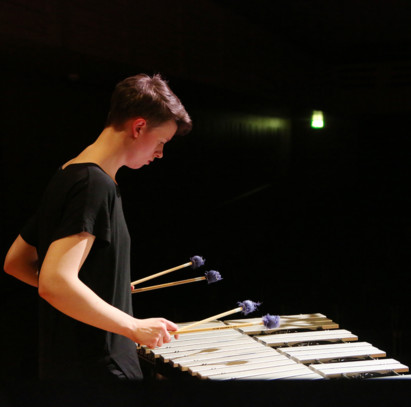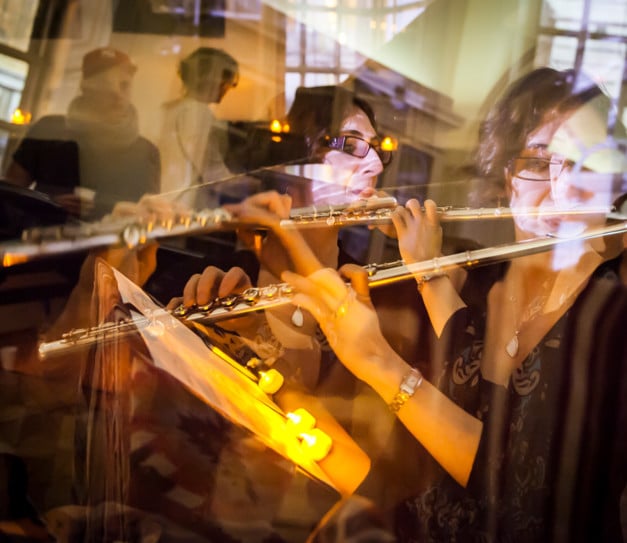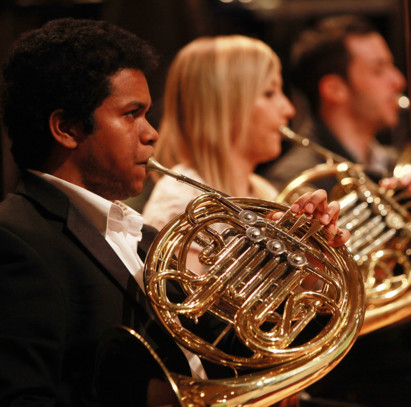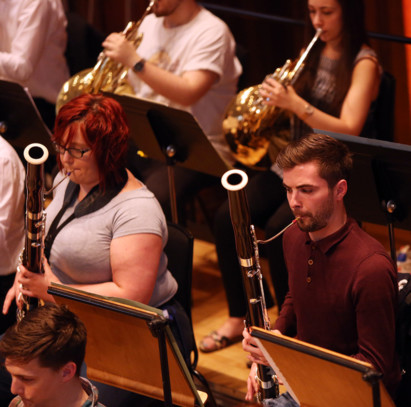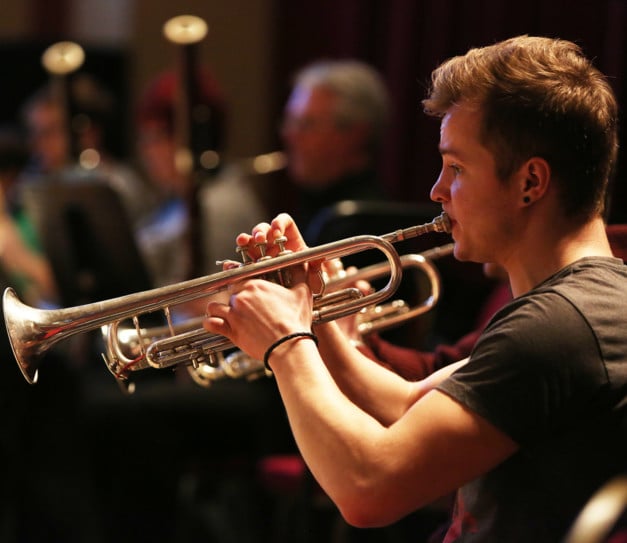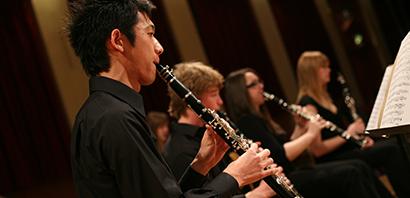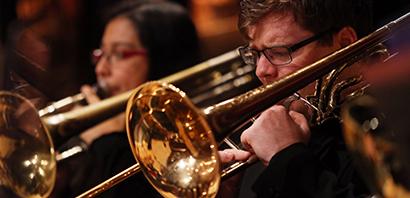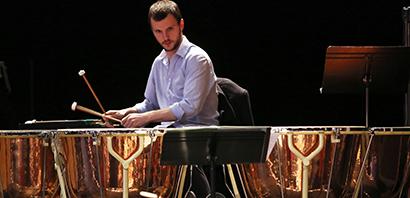Introduction
Studying a wind, brass or percussion instrument at Trinity Laban will allow you to combine rigorous technical training with the flexibility to develop as a creative individual. Our world-class teachers will inspire and support you as you develop as a musician and as a person, deepening your technical and musical understanding on your journey towards professional musicianship. Alongside intensive training, you will be encouraged to broaden your experience by collaborating with performers across the conservatoire.
We offer inspirational teachers, magnificent surroundings, unique performance opportunities and a supportive atmosphere helping you become a high-class, versatile musician.
Teaching
Individual Principal Study lessons will allow you to study with some of the best musicians in the world. Additional small group tuition and instrument-specific classes will enable you to further develop your skills. You may also study a related instrument, or another discipline to complement your specific interests.
Weekly Departmental classes support your Principal Study and equip you for the diverse world of professional music- making. Classes cover a host of topics, including repertoire, technique, style, genre, performance, transposition, sight reading, recording studio techniques, doubling, period instruments and combating performance anxiety.
You will benefit from regular chamber music coaching led by our renowned teachers, which encompasses both standard groups as well as more unusual combinations, cross-discipline groups, mixed media and improvisation. You will also be encouraged to utilise the diverse collaborative opportunities at your doorstep, whether that is developing key ensemble skills through weekly chamber music classes, or working with students from other departments and the Faculty of Dance through our annual CoLab festival.
View Wind, Brass and Percussion Teaching Staff
Collaboration
Under the direction of our acclaimed teaching staff, you will benefit from regular chamber music coaching which encompasses both standard groups such as quintets and dectets as well as more unusual combinations. We also encourage you to work with students from other genres, including cross-discipline groups, mixed media and improvisation.
Performance
Performance is vital to the life of the department. We encourage you to take every opportunity to refine your skills as a soloist, chamber and orchestral performer, from playing in large ensembles, to exploring chamber repertoire and improvisation-based work. Our ensembles include: symphony, chamber and opera orchestras, contemporary music group, musical theatre band, wind orchestra, saxophone choir, brass ensemble and percussion ensemble.
Our lunchtime concert series in the beautiful Old Royal Naval College Chapel and St Alfege Church provides regular opportunities to give public recitals, alongside opportunities to play at top London venues such as Kings Place, Southbank Centre, Blackheath Halls and Cadogan Hall.
Our regular Side by Side projects with top orchestras gives you the opportunity to perform together with world-leading professionals. Recent Side by Side projects have been given by the BBC Symphony Orchestra, BBC Concert Orchestra, Bournemouth Symphony Orchestra, Welsh National Opera Orchestra and the Philharmonia Orchestra.
Find out more about Music Performance Opportunities.
Facilities and Instruments
Instruments
The Department holds a large collection of woodwind instruments that students can borrow, often on long-term loan. The collection includes:
piccolos; alto flutes; bass flute; cors anglais; oboes d’amore; E-flat clarinets; C clarinets; A clarinets; basset horns; bass clarinets; contrabass clarinets in E-flat and B-flat; contrabassoons; and sopranino, soprano, alto, tenor, baritone and bass saxophones.
The Department holds a large collection of modern and period brass instruments that students can borrow, often on long-term loan. This includes:
piccolo trumpets; E-flat trumpets; cornets; flugel horns; alto trombones; tenor trombones; bass trombone; alphorns; natural trumpets; cornetts; hand horns; and alto, tenor and bass sackbuts. Many of our brass students choose to take a period instrument as a second study.
Facilities
There are dedicated practice suites for Brass and Percussion are available as well as a newly refurbished reed making facility for Woodwind.
/p>
Your Audition
We are encouraging applicants to audition in person where possible. However, if for whatever reason you are unable to attend a live audition in London online recorded auditions are available for all applicants.
In-person Auditions
Prior to audition, you must apply via UCAS Conservatoires. All auditions will be held in London at our Music Faculty between mid-November and mid-December. The address for the Music Faculty is: Trinity Laban Conservatoire of Music and Dance, King Charles Court, Old Royal Naval College, Greenwich, London SE10 9JF.
We will endeavour to schedule your audition as soon as possible and will update you with your audition date and time via UCAS Conservatoires and email. If you have any issues making this time, please let us know as soon as possible on the email on this page.
Audition Requirements
- All auditions will include a short discussion with the panel
- We do not have a dress code for auditions
- Where applicable an accompanist will be provided for you, you will have a rehearsal time of around 10 minutes with the accompanist prior to your audition. If you are bringing your own accompanist, let us know as soon as possible on the email below.
- If you have any accessibility requirements, please contact StudentServicesEnquiries@trinitylaban.ac.uk.
- Auditions do not include a written paper
- If you have also applied for BA Music Performance and Industry, details will be sent separately. You can find information on audition requirements and submission deadlines here.
Percussion and Timpani applicants must prepare the following:
- One tuned percussion study/ performance piece (unaccompanied)
- One side drum study/ performance piece
- One timpani study/ performance piece (suggested repertoire – Pflichtstuck Op-5 by Hans-Jorg Bayer)
- Beethoven No.5 – transition into 4th movement (3rd movement letter C, bar 324 to 4th movement 5th bar of letter B bar435). Excerpt to be played along with a recording, applicants can bring their own recording, or one will be provided.
- Applicants may be required take a short sight-reading test.
Percussion and Drum Kit applicants must prepare the following:
- One tuned percussion study/ performance piece (unaccompanied)
- One side drum study/ performance piece
- Two contrasting drum kit pieces of your own choice, written for your principal study instruments, and lasting no longer than 15 minutes in total
Applicants may be required take a short sight-reading test and/or improvisation test
All other instruments not listed above
Undergraduate Programmes (FCM, IFCM, BMUS)
Applicants must prepare two to three contrasting pieces of your own choice, written for your principal study instruments, and lasting no longer than 15 minutes in total.
Improvisation/sight reading may be required.
Postgraduate Programmes (Graduate/Professional/Artist Diplomas, MMUS, MAMEP)
Applicants must play a contrasting and suitably demanding programme of no more than 20 minutes in total.
Improvisation/sight reading may be required.
Recorded Auditions
Prior to submitting a recorded audition, you must apply via UCAS Conservatoires. Recordings will not be considered until a UCAS Conservatoires application has been submitted. When asked on UCAS Conservatoires where you wish to audition, simply click ‘recorded audition’ or ‘online’. You can watch our tutorial on submitting your UCAS Conservatoires application, for step-by-step instructions. Once you’ve submitted your application, our admissions team will be in touch with further information. Please keep an eye on your emails and check your spam inbox.
The deadline for submission of recorded audition materials is 27 October 2023.
Recording Your Audition
There should be two elements to your recording: a speech and a performance. You must submit a video recording of your speech and performance, and not only an audio recording. We do not require high production recordings, normally a recording on a phone or digital camera will suffice, but please check that the audio and video quality is clear before submitting your auditions.
We recommend sourcing a live accompanist if possible, however we can accept pre-recorded backing tracks and unaccompanied recordings. If you are playing with others, please make it clear who you are in the recording. There is no dress code for recorded auditions.
For the speech, you should record a passage of yourself speaking in English. For your speech you should:
- Introduce yourself by name
- Talk about your musical background and the training you’ve had
- Talk about your musical ambitions and your reasons for applying for the programme of study.
For the performance, you should record two to three works (or extracts) – further information on instrument requirements are below. Please note that the panel will wish to have some idea of the range of your ability, so provide works that demonstrate contrasting musical styles and instrumental/vocal technique.
You may be invited to an online discussion with the panel via Zoom, you will be updated via email if this has been scheduled.
Percussion and Timpani applicants must prepare the following:
- One tuned percussion study/ performance piece (unaccompanied)
- One side drum study/ performance piece
- One timpani study/ performance piece (suggested repertoire – Pflichtstuck Op-5 by Hans-Jorg Bayer)
- Beethoven No.5 – transition into 4th movement (3rd movement letter C, bar 324 to 4th movement 5th bar of letter B bar435). Excerpt to be played along with a recording, applicants can bring their own recording, or one will be provided.
- Applicants may be required take a short sight-reading test.
Percussion and Drum Kit applicants must prepare the following:
- One tuned percussion study/ performance piece (unaccompanied)
- One side drum study/ performance piece
- Two contrasting drum kit pieces of your own choice, written for your principal study instruments, and lasting no longer than 15 minutes in total.
All other instruments not listed above
Undergraduate Programmes (FCM, IFCM, BMUS)
Applicants must prepare two to three contrasting pieces of your own choice, written for your principal study instrument, and lasting no longer than 15 minutes in total.
Postgraduate Programmes (Graduate/Professional/Artist Diplomas, MMUS, MAMEP)
Applicants must play a contrasting and suitably demanding programme of no more than 20 minutes in total.
Submitting Your Audition on Embark
You must submit your audition via Embark. To submit a recorded audition, you will first need to create an account before submitting your recordings or portfolio. For step-by-step guidance on submitting your recorded auditions, watch our Embark tutorial.
You can submit multiple files to Embark (i.e. your audition does not need to be submitted as one take). If you have any issues with uploading your files, you can also upload your files to a video sharing website (such as YouTube or Vimeo) and paste the links into a word or PDF document to upload into the Additional Documents section.
You do not need to submit materials for every section, e.g. you only need to submit Transcripts or Additional Documents if you would like the panel to see these.
There are no written papers for auditions.
Please note, if the performance on the recording is found not to be your own, the place will be withdrawn immediately and no fees will be refunded.
If you have any questions, please don’t hesitate to get in touch: admissions@trinitylaban.ac.uk
Masterclasses
Learning directly from renowned professionals through our extensive series of masterclasses is a privilege that enhances your development as a musician. You will benefit from the expertise and experience of some of today’s eminent woodwind, brass and percussion players from around the world, including musicians from the Royal Stockholm Philharmonic, Los Angeles Philharmonic and the Royal Concertgebouw Orchestra.
Woodwind
Recent visitors include Arno Bornkamp, Mary-Karen Clardy, Adam Walker, Emily Beynon, Celia Craig, Rainer Gibbons, Barnaby Robson, Harri Mäki, Emily Hultmark, Jérôme Laran, Tong Yang, Jean-Denis Michat, and soloists from the Royal Stockholm Philharmonic.
Brass
Recent visitors include Nikolaj Viltoft, Byron Fulcher, Andrew Bain, Frank Lloyd, Szabolcs Zempléni, Philip Cobb, Thomas Hooten, John Wallace, Brandt Attema, Dudley Bright, Zoltan Kiss, Paul Milner, Sérgio Carolino and Patrick Harrild.
Percussion
Recent workshops have been given by Joby Burgess, Adrian Bending, Dave Elliott, Mark McDonald, Daniella Ganeva, Buster Birch, Kuljit Bhamra MBE and Andy Smith.
Graduates
Woodwind
Yasmin Ogilvie tours internationally with Astraeus Saxophone Quartet and dance bands Hedkandi, Ministry of Sound and High on Heels. Has recorded at prestigious locations including Maida Vale, Abbey Road and Pinewood Studios.
Kevin Banks is principal clarinet of the Bournemouth Symphony Orchestra, following eight years as principal clarinet with Opera North.
Claire McInerney has played in the house band on The X-Factor, Parkinson and Strictly Come Dancing, as well as in West End shows such as Dreamgirls, Phantom of the Opera and many more.
Danielle Hartley has played in numerous West End productions, including Merrily We Roll Along and Charlie and the Chocolate Factory.
Fiona Kelly is principal flute with the Swedish Chamber Orchestra, after being 2nd flute deputy with the New York Philharmonic.
Rebecca Allen is President of Decca Records. She was also named number 7 on the Woman’s Hour Power List 2018 of the Top 40 Women in Music.
Brass
Sarah Butler is Principal Trumpet of the Queensland Symphony Orchestra – the first and only female Principle trumpet player in the region.
Bernard Doughty plays trombone with the Orquesta Filarmónica de Gran Canaria.
Ian Parkes is horn soloist with the Seville Royal Symphony Orchestra and has performed with the London Symphony Orchestra, the Royal Liverpool Philharmonic, the Royal Opera House and the London Brass Consort.
Rob Croft is Head of Brass at Berkshire Maestros.
Percussion
Paul Turner is Principal Timpanist with the BBC Philharmonic Orchestra.
Kate Eyre is Principal Timpanist with English National Ballet.
Paul Philbert was the founding Section Principal Timpani with the Malaysian Philharmonic Orchestra. Paul was then Principal Timpanist with the Orchestra of Opera North UK for three years and is currently Section Principal Timpanist with the Royal Scottish National Orchestra and Principal Timpanist with Chineke! Orchestra.
Matt King is Principal Percussion in the Bournemouth Symphony Orchestra.
Corrina Silvester was Principal Percussionist for 42nd Street at the Theatre Royal Drury Lane.
Dave Elliott is a West End drummer who has played in numerous shows including Charlie and the Chocolate Factory, The Lion King, Mamma Mia!, Thriller Live and Jersey Boys.
Kieran Leonard was the featured bodhrán soloist on feature film How to Train your Dragon 2. He freelances regularly with English National Opera and plays with international touring show Celtic Legends.
To view the impressive organisations that our alumni have worked with, visit Alumni Destinations.
For more information on the successes of Trinity Laban Wind, Brass and Percussion graduates and what they have to say about the course, visit Alumni Profiles.
-
News
Leon Bosch awarded 2024 Cobbett Medal for Services to Chamber Music
The Worshipful Company of Musicians has awarded its 2024 William Willson Cobbett Medal for services to chamber music to celebrated musician and Trinity Laban Professor of Double Bass Leon Bosch.Fri 19 July 2024 -
News
Battle of the Bands at Blackheath Halls
Trinity Laban's inaugural Battle of the Bands for young musicians featured a huge diversity of talent, spanning genres from R&B to metal.Mon 15 July 2024
Wind, Brass and Percussion at Trinity Laban
Our Wind, Brass and Percussion students are trained to be first-class musicians and performers, able to work confidently at the highest levels. View the gallery to see our students in action.
- 1 - The Gold Medal Competition, held at Kings Place, London
- 2 - Rude Health: A Festival of New Music
- 3 - Trinity Laban Symphony Orchestra performing at Blackheath Halls, London
- 4 - Trinity Laban Symphony Orchestra performing at Cadogan Hall, London
- 5 - Side by Side project with members of Trinity Laban teaching staff
In This Section

